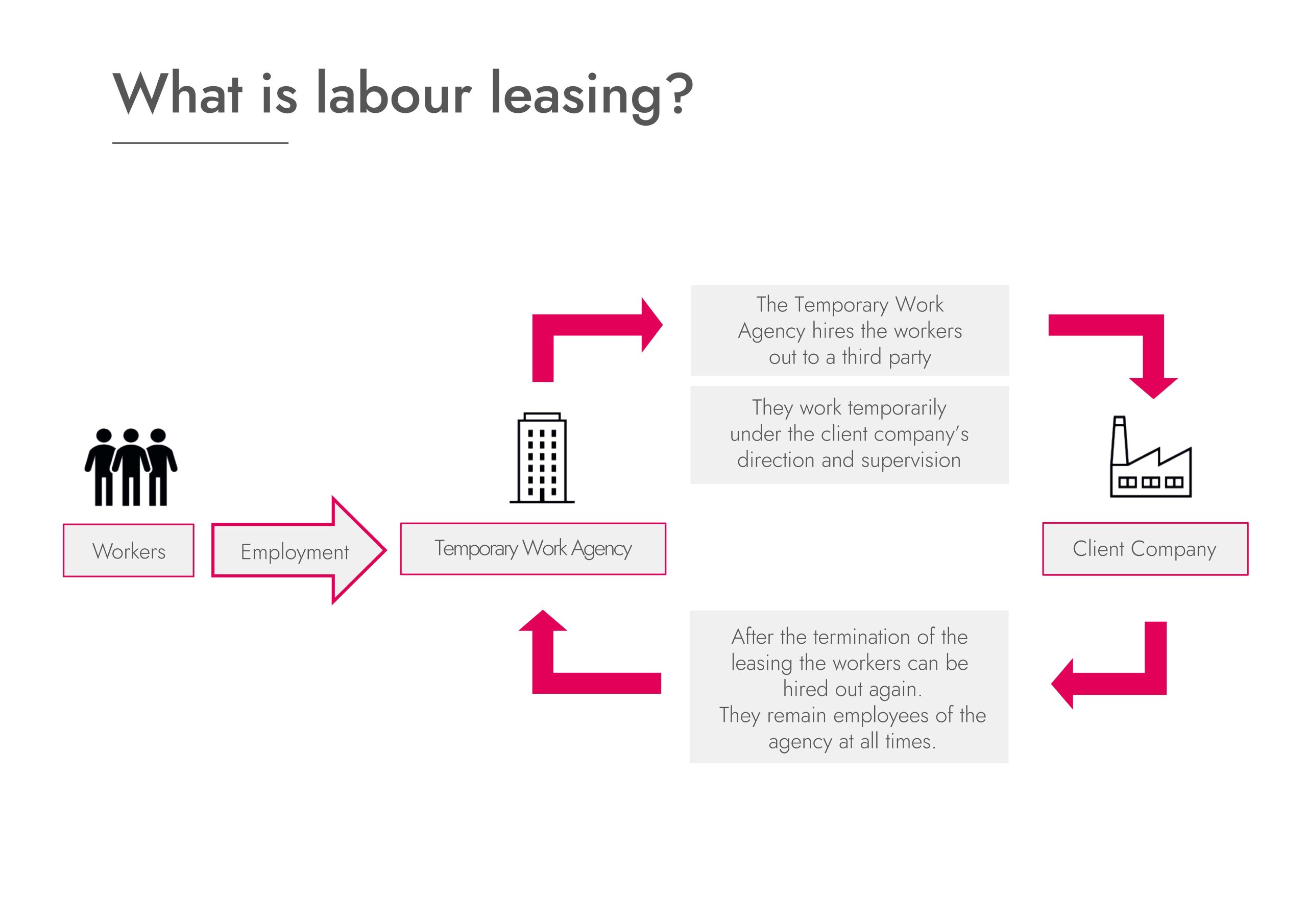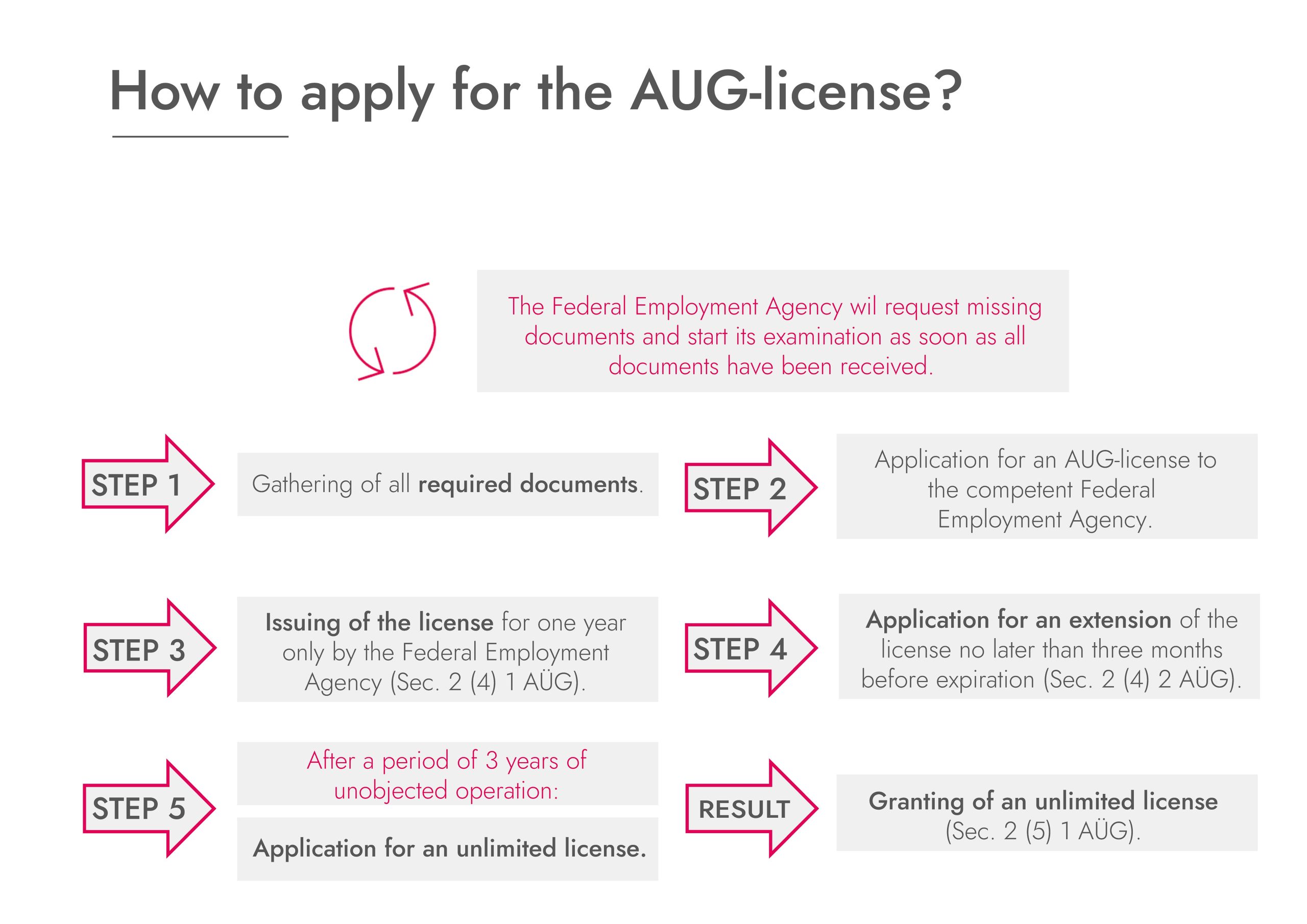AUG-license in Germany — how to apply?
We are a law firm in Berlin and specialize in the law of labor leasing / AUG in Germany and within the EU. Our attorneys offer legal advice to foreign companies planning to apply for the AUG-license either to run a national or transnational temporary work agency or to post workers to Germany.
We provide complete consultation, including the choice of legal form for your business, the procurement of a work permit as well as the application for issuing a license to supply temporary workers and finally the legal assistance in the daily personnel management.
For further information or legal advice, please do not hesitate to contact us via e‑mail (nadler@amethyst-recht.de) or phone (+49 (0)30 236 252 90).
What you need to know about the AUG-application in Germany
What is labor leasing (AUG)?
What is the legal basis for labor leasing in Germany?
Are there any restrictions?
How to apply for the AUG license?
Which documents do I need to submit?
What legal requirements apply to the employer-employee relationship?
Scope of testing
Fees
Helpful links
Kostenloses Newsletter-Abo
Unser Newsletter zur Zeitarbeit erscheint 6‑mal im Jahr und enthält eine Zusammenfassung wichtiger Entscheidungen und Branchentrends, sowie relevante Veranstaltungshinweise.
What is labor leasing (AUG)?
Labor leasing according to the German “Arbeitnehmerüberlassungsgesetz” is a form of employment where workers are employed by agencies (temporary work agencies) which in turn hire them out to a third party (the client company) where they work temporarily under the client company’s direction and supervision. The temporary worker is considered an employee of the agency, not of the hiring company. During his employment relationship the temporary worker can be hired out to several client companies. Once such work is performed cross-border, it represents a transnational temporary work agency.

What is the legal basis for AUG in Germany?
Overall, labor leasing in Germany is governed by federal laws, regulations in collective agreements as well as agreements between the works committee and management.
The most important body of laws regulating labor leasing on federal-level is the Labor Leasing Act (Arbeitnehmerüberlassungsgesetz, AÜG). Collective agreements regulate specific pay and working conditions. Furthermore, the works agreement may include establishment-specific rules for the use of temporary agency workers.
The German Federal Employment Agency (Bundesagentur für Arbeit, BA) is the supervisory authority of all labor leasing agencies operating in Germany. It regularly publishes information sheets concerning key provisions of the AUG.
Are there any restrictions of AUG-work in Germany?
According to the AÜG a labor leasing agency intending to make the service of temporary workers available to third parties on a commercial basis, requires a license issued by the respective Bundesagentur für Arbeit. In case an agency supplies a temporary worker without the required license the employment contract between the agency and the worker is null and void. Instead, an employment relationship between the client company and the worker comes about which begins on the date agreed upon by the agency and the client company (Sec. 10 (1) 1 AÜG).
In addition, the construction industry is subject to special restrictions: Hiring out temporary workers to companies in the construction industry for the purpose of performing work usually carried out by workers is permitted, (Sec. 1 b AÜG). Exceptions to this rule apply in certain circumstances.
How to apply for the AUG-license?
The license is initially issued for one year only (Sec. 2 (4) 1 AÜG). An application for extension of the license shall be substituted no later than three months before the end of the year (Sec. 2 (4) 2 AÜG). After a period of three years an unlimited license can be issued (Sec. 2 (5) 1 AÜG).
To apply for the license, the required documents must, at best, already be submitted in full, otherwise the Federal Employment Agency will request missing documents. As soon as all documents have been received by the authority, it will begin its examination. We support our clients with any questions the authorities may have.

Which documents do I need to sumbit?
For the initial issue of an AUG-license the following documents must be submitted to the respective Federal Employment Agency:
- Articles of association
- Certificate of good conduct
- Information from the commercial central register about the applicant and legal representatives of the enterprise
- Trade register excerpt
- Certificate from the health insurance in which most of the employees are insured, as far as contributions have been paid
- Declaration of consent for the request of information from the tax office
- Certificate from the employers’ liability insurance association
- Proof of liquid assets such as all bank deposits held on demand or credit confirmation regarding tolerated overdraft. In order to proof its creditworthiness, an agency that intends to hire up to five employees must proof liquid assets of at least EUR 10.000. With an intended employment of more than five employees, the amount increases to EUR 2.000 per employee.
- Sample employment contract and sample employee leasing agreement
Depending on where the registered office of the foreign enterprise is located, the comepetence for issuing a license differs.
Competent authority for granting a license:
| Federal Employment Agency | Competent for companies with registered office located in… |
| Düsseldorf | Poland, Great Britain and Ireland, Netherlands, Malta, Romania, Bulgaria, all non-EU/EWR states |
| Kiel/ Hannover | Denmark, Norway, Sweden, Finland, Iceland, Estonia, Latvia, Lithuania, Croatia, Hungary, Slovak Republic, Czech Republic |
| Nürnberg/ Stuttgart | Belgium, France, Luxembourg, Spain, Portugal, Italy, Greece, Austria, Liechtenstein, Slovenia, Cyprus |
Source: Federal Employment Agency
What legal requirements apply to the employer-employee relationship?
The employment relationship between agency and temporary agency worker is governed by labor law including all regular social security provisions. In addition, the principle of equality (Equal Treatment/ Equal Pay) applies to all employment relationships on a temporary basis. According to this principle, temporary workers are entitled to be given the same basic working conditions, including the same salary, as a similar employee within the hiring company. Other working conditions may be agreed upon by the agency and the worker as long as the minimum wage applicable to temporary work is met.
Basic working conditions include:
- duration of working time, overtime, breaks, rest periods, night work, holidays,
- remuneration (e.g., annual bonuses, allowances, bonuses, rewards, employer-side subsidies to occupational pension schemes).
Labor leasing agencies are exempt from the obligation to equality if:
- The application of an effective collective agreement was agreed upon in an employment contract.
- The hourly wage of the collective agreement does not fall below the minimum wage. The hourly minimum wage rates are currently at 13,50 € (since 01.01.2024).
If all these conditions are fulfilled, the provisions of the collective agreement apply to both periods of assignment and periods without assignment.
In practice, the exception has become the rule as it provides advantages for all parties affected: The client company does not have to disclose its remuneration system, the employees are not exposed to changes in their working conditions and the temporary work agency has a reduced administrative expenditure since the working conditions of its employees do not change constantly.
Scope of testing
When establishing a labor leasing agency, the Federal Employment Agency particularly examines the company owner’s personal reliability. If certain facts or circumstances indicate that the applicant will not comply with the applicable law and statutes, the Federal Employment Agency may deny the granting of a license. Examples of such facts, enumerated in Section 3 (1) Nr.1 AÜG, include non-compliance with:
- provisions of social security legislation,
- provisions of the SGB III on placement service as well as on the employment of foreigners (§ 284 ff. SGB III),
- provisions of employment protection legislation,
- obligations under employment law.
Fees
For issuing a limited license, the German Federal Employment Agency charges the applicant EUR 377. The fee for extending a limited license or granting an unlimited license amounts to up to EUR 2.060.
For our service regarding the application procedure, we charge a fixed fee of EUR 4.000 net. Included are all necessary steps, the absolutely necessary contract templates and explanations on questions from the Federal Agency along the application procedure.
Helpful Links
English language version of the German Federal Employment Agency (Bundesagentur für Arbeit).
Please find also more detailed information at “temp work in germany”; in the construction sector also our website soka-rechtsanwalt might be helpful.
Our services at a glance
- Written and verbal correspondence with the Federal Employment Agency as the competent licensing authority
- Support in obtaining the necessary application documents and requirements in Germany
- Liaising with our specialist translators
- Support in setting up a company with regard to staff leasing
- Advice on restructuring with regard to staff leasing
- Provision of required sample contracts, customised on request
- Advice on specific industry-related issues (health, IT, engineering, construction, security)
- Handling of the entire application procedure for both domestic and foreign companies
Ihre persönlichen Ansprechpartner

